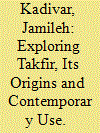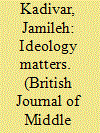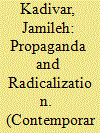|
|
|
Sort Order |
|
|
|
Items / Page
|
|
|
|
|
|
|
| Srl | Item |
| 1 |
ID:
174379


|
|
|
|
|
| Summary/Abstract |
Muslims have been the primary targets of Daesh’s attacks since 2014 in different countries such as Afghanistan, Iraq, and Syria. These attacks were based on its takfiri ideology. As Daesh official media and documents indicate, kufr (unbelief, infidelity) in Daesh’s approach is not limited to non-Muslims (original disbelievers), but Muslims are the most significant parts of kuffar (unbelievers) in its view and defined as incidental disbelievers. Through studying Daesh’s official documents and various Arabic, English, and Persian media productions, in an explanatory research, this article attempts to display Daesh’s takfiri approach toward Muslims and explains its historical and ideological roots, difference with Al-Qaeda’s takfiri approach, different approaches to takfir inside Daesh, main targets of Daesh’s takfir, and the reasons behinds its takfiri view. This article displays that for Daesh, the Muslims are limited only to Sunni Muslims who are accepting and following its approach. Other Sunni and non-Sunni Muslims are thus kuffar. This study also shows that the assertion of takfir has become a method for Daesh to discredit its opponents, such as Shi’a Muslims and other Muslim groups.
|
|
|
|
|
|
|
|
|
|
|
|
|
|
|
|
| 2 |
ID:
187009


|
|
|
|
|
| Summary/Abstract |
Since its inception, Daesh has been regarded as a powerful actor by pundits, journalists, and politicians. This paper’s primary aim is to show how, and by what cultural means, Daesh became so powerful, and to study what lies behind its non-coercive power. This paper is part of an ongoing research project designed to study the different aspects of Daesh’s power. Drawing on Gramsci’s ‘hegemonic power,’ and Bourdieu’s ‘cultural capital’, the research explains what it is in Daesh’s cultural power that creates consent. In doing so, this study examines the various English and Arabic content of Daesh’s official media and the documents it has released since June 2014. Additionally, data has been collected from 19 semi-structured expert interviews together with other secondary sources. The findings of the study show that Daesh’s power goes beyond its coercive power. This research acknowledges that Daesh’s ideology is central to its power and is present in all aspects of the Khilafah’s activities, including in its multi-faceted power (i.e., its cultural, media, political and economic power).
|
|
|
|
|
|
|
|
|
|
|
|
|
|
|
|
| 3 |
ID:
184342


|
|
|
|
|
| Summary/Abstract |
The process of becoming radicalized and joining extremist groups like Daesh, in countries with a Shi’a majority, such as Iran, is a controversial topic that has not received sufficient attention in the literature. This study examines Daesh’s media content in Farsi and seeks to provide an analysis of Daesh’s main messages, which have the primary objective of profoundly impacting their target audiences in Iran. This study collected data from 16 Iranian members of Daesh to discover how they were radicalized and why they decided to join Daesh. This study seeks to understand whether the media and Daesh’s propaganda are indeed the key reasons behind the radicalization of Daesh’s Iranian members and the creation of others’ perception of their mindsets against Iran and its Shi’a population, and to discover other possible factors that play a role in the radicalization process. While Daesh media and messages hold salience in relation to the Daeshization of some, studying such complex socio-political issues is rooted in an amalgamation of different personal, social, political, economic, and cultural push and pull factors. Such phenomena cannot, therefore, be reduced to only one of the mentioned elements.
|
|
|
|
|
|
|
|
|
|
|
|
|
|
|
|
|
|
|
|
|